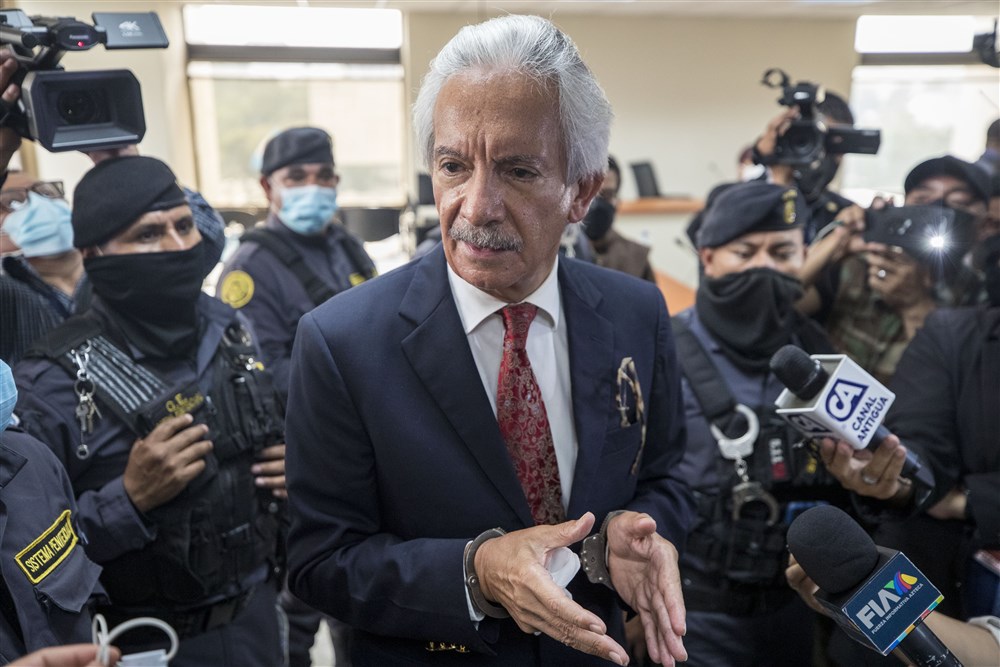The IPI global press freedom network reiterated its call on Guatemala to immediately release IPI World Press Freedom José Rubén Zamora, who has been jailed since July on money-laundering charges that are widely considered politically motivated. Zamora faces a next hearing in the case on December 8.
Zamora, the president and founder of the independent newspaper elPeriódico, was arrested on July 29 on charges including alleged money laundering, blackmail, and influence peddling. He remains in pre-trial detention, where he is being held in isolated conditions, according to his son, who spoke to IPI this week via phone. On the day of the arrest, police also raided the headquarters of elPeriódico during which they forced employees out of the building and in some cases confiscated equipment, the newspaper reported.
The arrest of Zamora is widely seen as an act of persecution and censorship against critical media in the context of a broader crackdown on journalists, activists, prosecutors, judges, and others involved in investigating official corruption in Guatemala.
In July, the Association of Guatemalan Journalists said that the “accusations against Zamora and elPeriódico are part of a campaign of persecution, criminalization, and censorship” on the part of the state. It characterized the raids on the newspaper and Zamora’s home as an “act of revenge” by the country’s attorney general for elPeriódico’s reporting on corruption. At the end of November, the association said it had recorded 100 incidents of censorship and restrictions on reporting over the past year.
Prosecutors claim that Zamora laundered the equivalent of about €40,000 through a blackmail scheme – a claim that Zamora and his legal team have strongly rejected. Zamora’s son, also named José Zamora, told IPI that the funds in question were donations to the newspaper by businessmen whose identities were not made public in order to protect them. He said that his father’s legal team would provide evidence of the legality of the transaction in the upcoming trial.
elPeriódico has come under pressure as the government has withdrawn public advertising and leaned on private advertisers to follow suit, worsening the newspaper’s financial situation. Last month, the paper announced that it was forced to end its print edition. In an application to the Inter-American Commission of Human Rights requesting an emergency injunction in the case, which was viewed by IPI, lawyers representing Zamora highlighted the Guatemalan government’s economic attacks on the newspaper, which the brief said have included pressure on advertisers, threats to reporters, the freezing of the paper’s bank accounts in the wake of the arrest, and the arrest of Zamora, who played a crucial role in raising funds for the paper. The newspaper’s two main accounts remain frozen.
IPI Deputy Director Scott Griffen called on Guatemalan authorities to release Zamora.
“José Rubén Zamora is one of Central America’s most respected journalists. Guatemala should immediately release him and stop all forms of harassment of him and elPeriódico in response to their journalism”, he said. “Authorities in Guatemala must allow all journalists in the country to do their jobs – including investigating corruption and other forms of wrongdoing – without fear of retaliation. This case is testament to a deeply concerning democratic backslide in Guatemala and in Central America more broadly.”
Zamora is currently being held in Mariscal Zavala prison in Guatemala City in conditions that his son described as isolating. He is confined to his cell 23 hours a day.
While Zamora has had access to his lawyers, members of his legal team have themselves faced harassment. He is currently represented by a fourth lawyer, after the previous three resigned after facing forms of harassment, Zamora’s son said. This has included being threatened with legal action, a sudden loss of clients, and online harassment.
Zamora is the recipient of numerous awards, including IPI’s World Press Freedom Hero award and the International Press Freedom Award of the Committee to Protect Journalists (CPJ).
His arrest comes in the context of serious attacks on press freedom across Central America. Independent media in El Salvador face growing harassment and government efforts to discredit them. This year, Canada’s Citizen Lab revealed that the phones of IPI World Press Freedom Hero Carlos Dada and 21 of his colleagues at the news site El Faro were hacked and surveilled using the infamous Pegasus spyware during a time when El Faro was investigating links between the Salvadoran government and criminal organizations.
Recent years have also seen a severe crackdown on press freedom in Nicaragua under the authoritarian regime of long-time President Daniel Ortega, which has systematically sought to suppress dissident voices. The Nicaraguan press has faced brutal oppression by the authorities since the start of a social and political crisis in the country in 2018. Journalists face threats, harassment, and detention, with many forced into exile. Independent media outlets have been hounded into submission or closure.
